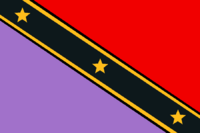Elodian: Difference between revisions
mNo edit summary |
|||
| Line 40: | Line 40: | ||
The PIE case system was drastically simplified, however inflections show some of the inherited complexity. Stems are given with two forms: the nominative/absolutive singular ending and the oblique stem vowel used for all other cases: the case endings are agglutinated to this stem, and generally have postvocalic and postconsonantal allomorphs. There are six cases - nominative/absolutive, ergative, accusative, dative, equative (a likely Hurrian influence) and locative - plus a relic genitive. | The PIE case system was drastically simplified, however inflections show some of the inherited complexity. Stems are given with two forms: the nominative/absolutive singular ending and the oblique stem vowel used for all other cases: the case endings are agglutinated to this stem, and generally have postvocalic and postconsonantal allomorphs. There are six cases - nominative/absolutive, ergative, accusative, dative, equative (a likely Hurrian influence) and locative - plus a relic genitive. | ||
Most letters have their IPA values, except '''ng''' {{IPA|/ŋ/}}, '''ǝ''' {{IPA|/ɛ/}}, '''ṛ''' {{IPA|/ɽ~ɻ/}}, '''š''' {{IPA|/ʃ/}}, '''o''' {{IPA|/ɔ/}}. Long vowels are marked with a macron. | Most letters have their IPA values, except '''c''' {{IPA|/tʃ/}} '''j''' {{IPA|/dʒ/}} '''ng''' {{IPA|/ŋ/}}, '''ǝ''' {{IPA|/ɛ/}}, '''ṛ''' {{IPA|/ɽ~ɻ/}}, '''š''' {{IPA|/ʃ/}}, '''o''' {{IPA|/ɔ/}}. Long vowels are marked with a macron. | ||
==See also== | ==See also== | ||
Revision as of 15:56, 14 July 2022
| Elodian | |
|---|---|
| ɂelodīru, gulkā ɂelodīrā | |
 | |
| Pronunciation | [ˈguɬkɑː ʔelɔˈdiːraː] |
| Created by | Lili21 |
| Date | Jul 2022 |
| Setting | Alt-Earth |
| Ethnicity | Elodians (ɂelodī) |
| Native speakers | 12,000,000 (2021) |
Indo-European
| |
| Official status | |
Official language in | ʔelodīhūto |
| Regulated by | National Language Academy of ʔelodīhūto Kalēmīa Mellī twā Gulkā twā ʔelodīhūto |
Important note: Elodian is, fundamentally, a rethinking of Lifashian intended as a kind of drop-in replacement in its setting.
Elodian, natively referred to as ɂelodīru or gulkā ɂelodīrā, is an Indo-European language, an isolate inside the family, spoken in an alternate timeline of Earth in the northeastern corner of Asia Minor, i.e. the historical region of Pontus and neighboring areas across the Pontic Alps into the Armenian highlands. It is the official language of the republic of ʔelodīhūto, spoken by the majority of its population. Elodian is the native language of about twelve million people in the world, the majority of which in ʔelodīhūto, with smaller communities in Eastern Turkey, Syria, Iran and Iraq.
Elodian developed on its own, distinctly from other Indo-European languages, although it is definitely closer to the Anatolian languages, particularly the Luwian subgroup, than to other languages in the family, despite sharing some traits with Armenian and Greek. It is particularly noteworthy due to its system of split ergativity, which makes it virtually an ergative-absolutive language (although not syntactically ergative) except with first- and second-person referents, which require a nominative-accusative alignment.
Its vocabulary has a substantial number of inherited roots, but through millennia the language absorbed many loanwords, especially from Persian and Arabic (through the former), and to smaller extents from its neighbours Armenian, the Kartvelian languages and Turkish, as well as from Greek and Russian. Long-term Genoese colonization and reciprocal contacts also introduced many Ligurian loans, as well as forming one of the main ethnic minorities in the country, Elodian Ligurians, which had a marked influence on the culture of coastal urban areas.
It is written in the Elodian alphabet, a bicameral script ultimately related to other ancient scripts of Asia Minor like the Lydian alphabet.
Miscellanea
(This section exists mostly as a placeholder for "interesting things" about the language to justify the existence of this page, until I write the full phonology, morphology, syntax sections.)
Proto-Elodian underwent a change similar to Grimm's Law in Proto-Germanic or even closer to the one in Proto-Armenian; however, it did not affect labiovelars. The most strikingly Elodian correspondence is PIE *t > Elodian l, through an intermediate *ð stage.
The endonym ɂelodi is from PIE *h₁léwdʰis.
The PIE case system was drastically simplified, however inflections show some of the inherited complexity. Stems are given with two forms: the nominative/absolutive singular ending and the oblique stem vowel used for all other cases: the case endings are agglutinated to this stem, and generally have postvocalic and postconsonantal allomorphs. There are six cases - nominative/absolutive, ergative, accusative, dative, equative (a likely Hurrian influence) and locative - plus a relic genitive.
Most letters have their IPA values, except c /tʃ/ j /dʒ/ ng /ŋ/, ǝ /ɛ/, ṛ /ɽ~ɻ/, š /ʃ/, o /ɔ/. Long vowels are marked with a macron.